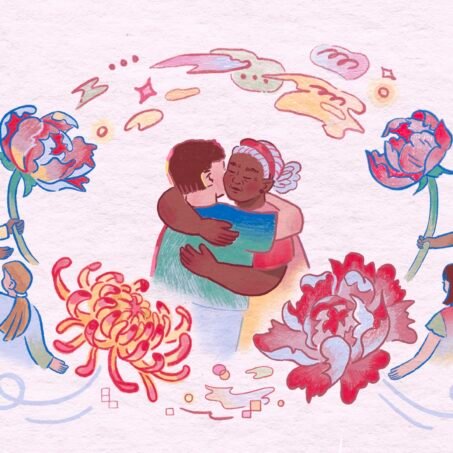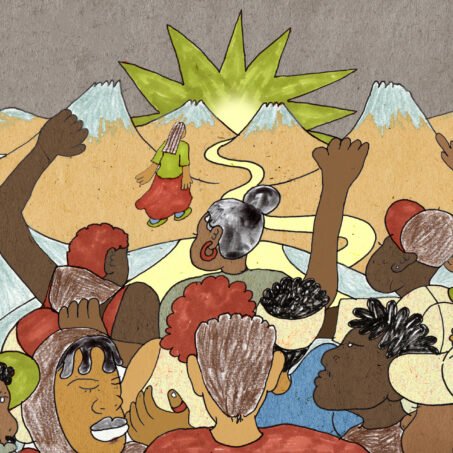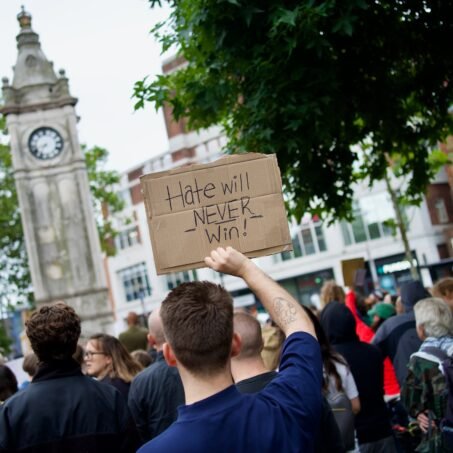When I read Rebecca Kuang’s Sunday Times and New York Times bestselling satire, Yellowface, I gave up picking my jaw up off the floor. I just left it there until I finished the book. As a British-Asian author, Yellowface thrilled, challenged and depressed me. When I was finished it left me with a single thought: what am I supposed to do with this?
The novel opens with June Hayward – a white author with a stalled literary career – toasting to her frenemy, Athena Liu, and their Netflix deal. Athena has everything June doesn’t: a multi-book deal straight out of university; a history of award nominations; three published novels; and now a TV show. Flinging back drinks, June wonders “what it’s like to be you?” She soon finds out. After celebratory cocktails morph into whiskey night caps at Athena’s minimalist, bougie-sleek apartment, Athena dies. As ambulance sirens blare, June seizes the literary success she’s been green-eyeing by seizing Athena’s latest manuscript.
What follows is a Talented Mr Ripley-esque descent into June’s literary moral corruption. Athena’s manuscript, edited by June, sells at auction for an eye watering advance. Then, the echo chamber of white publishing kicks in. Because June’s stolen text The Last Front is about the unsung contributions and experiences of the 140,000 Chinese Labour Corps recruited by the British Army and sent to the Allied Front during World War, it’s ultimately an Asian story. But June isn’t Asian. Eager to remain on the right side of her publishers, she agrees to soften Athena’s depiction of racism. She silences the lone Asian voice who raises the spectre of cultural appropriation. She allows herself to be rebranded as the racially ambiguous “Juniper Song.”
It works. The Last Front hits the New York Times Bestseller List.
So far, so American Dirt. In many ways, Yellowface is a satire of what happened to Jeanine Cummins in 2020. Like June, Cummins, who self-identifies as white, received a seven-figure advance for a book about a Mexican mother and son’s escape to the US. Like The Last Front, the marketing for American Dirt implied a direct connection to the Mexican experience, which subsequently turned out to be false. Although not even Kuang’s prodigious imagination could top the barbed wire manicures vaunted on Cummins’ Twitter feed or the barbed wire centrepieces at American Dirt’s bookseller’s dinner.
As an author, what’s horrifying about the literary scandal in Yellowface isn’t how it parallels American Dirt, but how it reflects the dangerous, fiercely-held belief I’ve heard an astonishing number of times: that publishing is only interested in diverse stories. Here’s a selection of comments I’ve come across in just the past few weeks:
“My manuscript has been […] declined by more than 250 fiction agents who merely decline by form letter. I have no idea what could be wrong. I have a great story, but maybe for the wrong time. I am not a BIPOC author and my characters are not BIPOC, which seems to be a lot of what agents are looking for.”
“She was lucky to get published by Hodder and Stoughton. Perhaps her ethnic background helped. I’m bound to say that it seems like one has to have some minority status these days to get attention from agents and publishers and win competitions.”
Let me be clear. There is no yellow peril. Authors of colour have not stolen book deals from white authors. The opposite remains the case. White authors are more likely to achieve higher advances than authors of colour. White authors are more likely to hit the bestseller list. My back-of-the-envelope calculations on The Sunday Times Bestsellers List Top 100 Sellers of 2022 show that 89% were white authors. Only 7% were authors of colour. When June thinks, “Publishing picks a winner – someone attractive enough, someone cool and young and oh, we’re all thinking it, let’s just say it, diverse enough – and lavishes all its money and resources on them,” that’s not even close to true.
But for me, the brilliance of Yellowface isn’t its exploration of June’s cultural appropriation; this is, depressingly, old news. It’s Kuang’s razor-sharp dissection of Athena’s cultural appropriation. Because Athena is privileged. An expensive education at British boarding schools, then Yale, she benefits from a fully funded masters and stratospheric early success. Apart from race, she has no more connection to the Chinese labourers in The Last Front than June. Like June, she is involved in multiple literary thefts – she steals the details of June’s sexual assault for a short story; she pilfers memories from old men at a Korean War exhibit.
While there is no condoning Athena’s exploitation of sexual or wartime trauma, I find Kuang’s portrayal of Athena deeply interesting. All too often, Asians are portrayed as “good immigrants” – hardworking, demure, passive. It is a racial stereotype so powerful that I am constantly asked why I chose to make the Singaporean mother, May, in my novel Bad Fruit so horrible, so abusive. Can’t Asians be nasty too? Or is that a privilege reserved only for white people?
In Bad Fruit, 17 year-old British-Asian Lily mysteriously begins to have memories of May’s childhood. May is a profoundly damaged and damaging woman. Othered from her favourite daughter in white-dominated London (Lily is the “whitest” of her children) and suffering from deep-seated trauma, she forces Lily to yellowface herself – to put on yellow-toned make-up, wear brown contact lenses, dye her hair black. In many ways, there are strong parallels between May and Athena. Like Athena, May engages in toxic relationships and acts out of profound insecurities.
Which leads to the central issue I’m preoccupied with when it comes to diversity in publishing: What stories are we allowed to tell? Later in Yellowface, we discover that Athena’s experience is far from rosy: “Do you know how much shit Athena got from this industry…They marked her as their token, exotic Asian girl. Every time she tried to branch out to new projects, they kept insisting that Asian was her brand, was what her audience expected. They never let her talk about anything other than being an immigrant, other than the fact that half her family died in Cambodia, that her father killed himself on the twenty-fifth anniversary of Tiananmen. Racial trauma sells, right?”
Yes, racial trauma sells. But only a very specific form. As American Dirt proves, the publishing industry is very willing to pour marketing dollars into perpetuating racial stereotypes for a white audience. Apart from one fly in the ointment. Racial trauma shouldn’t be a commodity. It shouldn’t be mined, refined, packaged and sold. It needs to be communicated truthfully, sensitively, respectfully. Because fiction isn’t an excuse. Fiction is a gift.
I want to buy the book Athena wanted to write. I want to read the story she wasn’t allowed to tell.
Bad Fruit was a story I nearly didn’t tell. There was so much resistance to the yellowfacing – it was too much, was I exploiting racial trauma, was I racist? Part of me understood it, I have multiracial daughters myself, there is horror attached to the thought of yellowfacing a child. Then I thought about what yellowfacing really is. How it is an act of obliteration. How the body itself becomes the site of dispossession.
It is not a story that fits into racial stereotypes. There are no slanted-eye jokes in the playground, no horror at dumplings in lunch boxes. But, as a mother of two multiracial daughters, it felt urgent to explore something that is rife in communities of colour and the ramifications of othering multiracial children from their parents and themselves.
I return to the question Yellowface left me with: What am I supposed to do with this? As a reader, I am trying to look beyond the fiction publishing offers on its book tables, I am searching for the stories publishing isn’t pushing. As an author, I am trying to write the stories I want to tell, no matter if they fall outside paradigms of white racism. I am refusing again and again the Faustian offer to flatten identify and commoditise racial trauma. I am joining the clarion call for true diversity in publishing.
What can you do?
Keep reading!
- Babel, R.F. Kuang
- Disorientation, Elaine Hsieh Chou
- East Side Voices, edited by Helena Lee
- Minor Feelings, Cathy Park Hong
- The Good Immigrant, edited by Nikesh Shukla
- The Good Immigrants, Madeline T. Hsu






